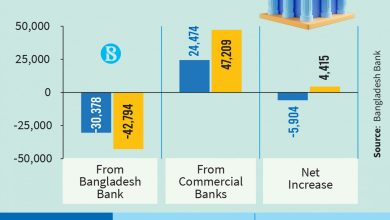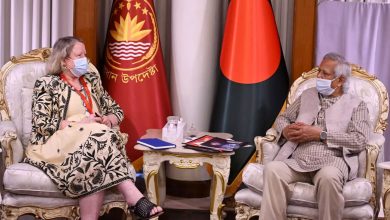Deepening dollar crisis: Unveiling causes and solutions
In a roundtable organised by The Business Standard on 3 December, speakers expressed their opinions that predictability of the economy is of urgent need

The mismanagement of the economy over a long period has led to the current crisis in foreign currency reserves, and businessmen, bankers and an economist call for urgent harsh reforms including letting the market forces fix foreign exchange rates.
In a roundtable organised by The Business Standard on 3 December, speakers expressed their opinions that predictability of the economy is of urgent need without which businesses were struggling to import raw materials and intermediate goods required for running their factories and such crises would compel foreign lenders to shy away from investing, compounding the crisis.
They were speaking at the inaugural session of a series of Focus Group Discussions as part of the fourth anniversary celebrations of The Business Standard.
The first session titled “Unrelenting slide in forex reserves: What to do” was held at the conference room of the paper on the day.
Inam Ahmed, the editor of the newspaper, moderated the discussion. The panel included experts in the foreign exchange market, representatives from businesses, banks and an economist.
Those who were present included Dr Monzur Hossain, research director at Bangladesh Institute of Development Studies (BIDS); Anis A Khan, a former president of the Association of Bankers, Bangladesh (ABB), a forum of bank CEOs; Masud Khan, chairman of Unilever Consumer Care; Nurul Amin, another former chairman of the ABB; Lutful Bari, general secretary of the Bangladesh Bicycle Manufacturers and Exporters Association; and Atiar Rahman, head of finance at Omera Petroleum.
The discussants said failure to address these challenges is impacting businesses in almost every sector.
For example, consider a bicycle exporter who initially calculates orders based on Tk110 per dollar. However, when faced with a dollar costing Tk115 or more for procuring raw materials, he had no way to pass the cost on to the buyers.
Similarly, LPG importers find themselves in a predicament as they are compelled to import LPG at Tk5-10 more than the official rate, leading to additional under-the-table payments. When the regulator fixes the retail price, they only take into account the official exchange rate, causing huge losses for the businesses.
It has become common practice for banks to inform their clients that while they can open letters of credit (LCs), they are unable to provide the necessary dollars. The burden of managing dollars is thus shifted onto the clients. This has become a daily challenge for businesses.
Even Bangladesh is grappling with severe difficulties in meeting its financial obligations to airlines and shipping companies due to the ongoing dollar crisis. Students are finding it hard to pay their tuition fees, and patients seeking treatment abroad are struggling to secure sufficient dollars.
Surprisingly, while dollars are scarce in banks, they are available in the informal market, albeit inadequately. Those in need find themselves compelled to acquire them at a considerably higher price than the official exchange rate of Tk110-111.
“If we had been selling a dollar at Tk110 a year ago, the pressure would have been absorbed better now,” said Dr Monzur Hossain, research director at Bangladesh Institute of Development Studies (BIDS). He added that, unfortunately, this was not the case, and the issue has now become more acute.
The economist also questioned the central bank’s management of the exchange rate, expressing scepticism that if it is based on hundi (informal market), it may not be effective.
Anis A Khan, a former president of the Association of Bankers, Bangladesh, a forum of banks’ CEOs, said he has never seen such a crisis of dollars.
“I don’t know where the leakage is. We are not processing payments for airlines and shipping bills, and we have also halted remittances for students’ tuition fees abroad,” remarked Anis, who serves as an independent director on the boards of several private companies.
“This situation has emerged due to a crisis of confidence in macroeconomic performance,” he added.
Masud Khan, chairman of Unilever Consumer Care, noted that banks are reluctant to open sight LCs, and they have also decelerated payment processes. He said multinational companies have been facing challenges in remitting dividends and technical assistance fees for the past year.
Nurul Amin, another former chairman of the ABB, pointed out that due to Bangladesh’s over-dependence on imports, attempting to control it won’t be effective. He also said a decline in imports could pose challenges for much-needed job creation in the country.

What are the factors contributing to the crisis?
Dr Monzur Hossain highlighted the dynamics of Bangladesh’s economic challenges, tracing them back to the Covid-19 pandemic when forex reserves reached $48 billion in August 2021. During this crisis, low aggregate demand and import levels were offset by an overflow of exports and remittances. However, the failure to appreciate the exchange rate at that time set the stage for future crises.
It was foreseeable that this reserve wouldn’t be sustained. “Many of us suggested using the reserve dollar to be invested, and we opted for short-term foreign loans for corporates (for the private sector),” Monzur said.
He said the aftermath of the Ukraine-Russia war triggered a double crisis as commodity prices surged, forcing the Bangladesh Bank to sell dollars to meet demand. The reversal of pandemic-era factors, with dropping remittances and surging imports, led to the depletion of reserves as the country attempted to artificially retain dollars.
Monzur criticised the exchange rate mismanagement during the covid pandemic and the post-Covid period, emphasising that gradual market adjustments could have cushioned the crisis. Reforms, such as oil price adjustments, pushed up inflation, and the failure to let interest rates rise through a market mechanism worsened economic conditions.
He said the current account deficit was managed by controlling imports, but this strategy adversely impacted the economy. The exchange rate’s official depreciation by around 30% since the Russia-Ukraine war has eroded Bangladesh’s competitiveness.
“The crisis today is a consequence of macroeconomic mismanagement,” said Monzur.
Political uncertainty, compounded by money laundering and hundi activities, has further worsened the crisis, contributing to the multifaceted challenges faced by the country.
Anis A Khan, former managing director of Mutual Trust Bank and ex-ABB Chairman, asserted that artificially fixing rates instead of allowing them to float in the market is ineffective. Drawing lessons from the Asian currency crisis, he said that the exchange rate tends to rebound when allowed to adjust naturally in the market.
Disconnection between rates and market dynamics, coupled with restrictions on foreign currency spending, is fostering unofficial foreign currency transactions, he said.
Anis also pointed to the issue of reverse remittances to countries such as India, Sri Lanka, Korea, and others from Bangladesh, contributing to the outflow of dollars. He identified inefficiencies in managing the economy and a lack of coordination between the Bangladesh Bank and the Ministry of Finance as significant challenges.
He noted that the confidence of non-resident Bangladeshis has eroded due to the breach of conditions related to the wage earners’ bond.
Masud Khan, chairman of Unilever Consumer Care Bangladesh, said that despite a current account deficit during the Covid-19 pandemic, the balance of payments grew due to positive financial accounts. With Libor at 0.5%, Bangladesh’s favourable credit position enabled the private sector to access inexpensive foreign loans.
He noted that the stability of the taka was maintained as the central bank did not adjust it with the real effective exchange rate (REER), and a low oil price contributed to building reserves.
However, the current scenario has shifted, and Bangladesh’s diminished credit rating poses challenges for easy foreign lending. He pointed out that over the years, official money laundering has been facilitated through tariff value manipulations in imports, and significant under-invoicing in exports.
He said the strength of a vast hundi market surpasses the relatively small cash dollar market. The existence of multiple rates, artificially maintained exchange rates, and complexities in remittance processes contribute to the strength of the hundi market.
Former ABB chairman Nurul Amin said the problem is with the supply side and the artificial management of exchange rates. He also questioned the ABB’s role in fixing exchange rates as it has no legal authority to do so.
“The crisis is a result of mismanagement,” he said.
He also said not all remittances are directed to Bangladesh now; instead, these are flowing to destinations like Dubai, Singapore, or Canada through Hundiwala.
Atiar Rahman, head of finance at Omera Petroleum, highlighted the influence of key macroeconomic factors – exchange rate, inflation rate, and interest rate – on the current economic situation. While official inflation figures may appear low, the impact is significantly greater for the masses, primarily driven by the 3Fs: fuel, fertiliser, and food, which are contributing to persistent inflation.
He pointed out a shift in the import dynamics, with Bangladesh now importing food commodities like eggs and green chilli, which were not imported before. This change is attributed to active cartels in essential commodities, prioritising guaranteed profits.
Moreover, Atiar said the present crisis is intensified by the hoarding of dollars and gold adding another layer of complexity to the economic challenges faced by the country.
Lutful Bari, general secretary of the Bangladesh Bicycle Manufacturers and Exporters Association, talked about the difficulty faced by their industry when providing price quotations to buyers. “Determining the appropriate exchange rate for offering quotes to foreign buyers has become a challenge,” he remarked.
He highlighted the concerns of foreign investors, noting that the prevailing uncertainty in exchange rates and the ongoing dollar crisis hinder their ability to formulate future investment plans. Bari emphasised the urgent need for stability and policy predictability in foreign currency and exchange rates to instil confidence and facilitate strategic decision-making for businesses.
Way out
If not immediate, the government can think of medium and long-term solutions for the ongoing crisis, said Monzur of BIDS. A market-based exchange rate alone without reforms in the macroeconomy and financial sector will not be able to control inflation. He suggested correcting the economic fundamentals and reforming the financial sector for better results.
Monzur proposed five key suggestions to address the challenges. These include: Opting for a lending rate adjustment instead of SMART (six-month moving average rate of treasury bill), providing subsidies to reduce energy prices, managing the exchange rate based on demand and supply dynamics, deferring short-term foreign loans, and creating a currency basket to decrease reliance on the US dollar.
Masud Khan said the exchange rate has to be determined based on the demand and supply and there is no alternative to this. He also asked the government to respect remitters and provide quality services for them who in turn would be encouraged to send in remittances.
Anis A Khan said the country’s financial sector needs strong leadership who will make decisions based on consultation with the stakeholders. He highlighted the deficiency in expert manpower at the Bangladesh Bank, particularly in understanding monetary policy. Also, he stressed the importance of restoring confidence to attract investments in bonds from Non-Resident Bangladeshis.
Nurul Amin said increasing the supply of the US dollar is the key to addressing the ongoing dollar crisis. Also, the country can bolster the supply by diligently securing committed foreign loans from the World Bank and the Asian Development Bank through strong efforts, he noted.





